北师大版 高一上册 模块1 Unit 3 Celebration Lesson3 Weddings课件(49张PPT)
文档属性
| 名称 | 北师大版 高一上册 模块1 Unit 3 Celebration Lesson3 Weddings课件(49张PPT) |
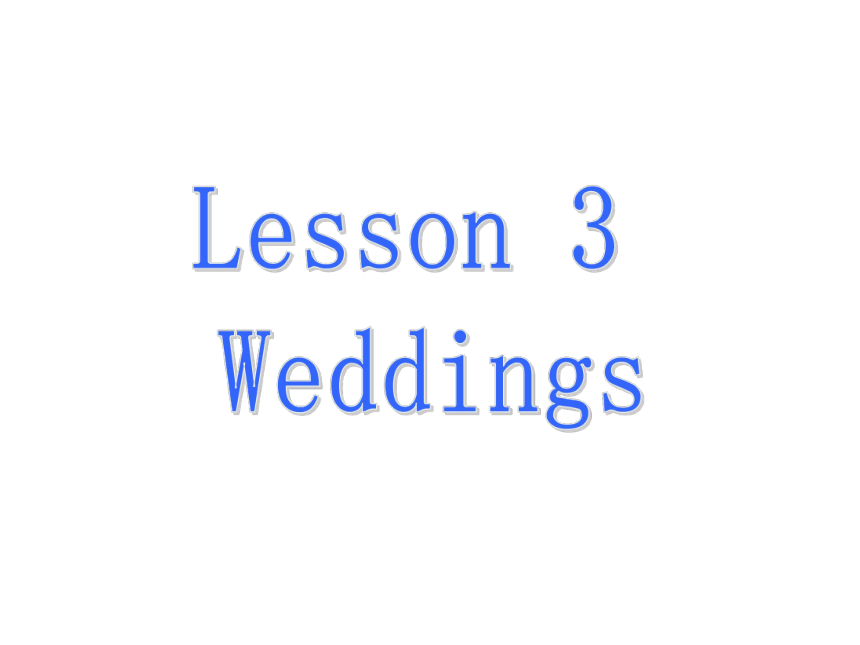
|
|
| 格式 | ppt | ||
| 文件大小 | 1.4MB | ||
| 资源类型 | 教案 | ||
| 版本资源 | 北师大版 | ||
| 科目 | 英语 | ||
| 更新时间 | 2021-08-07 00:00:00 | ||
图片预览

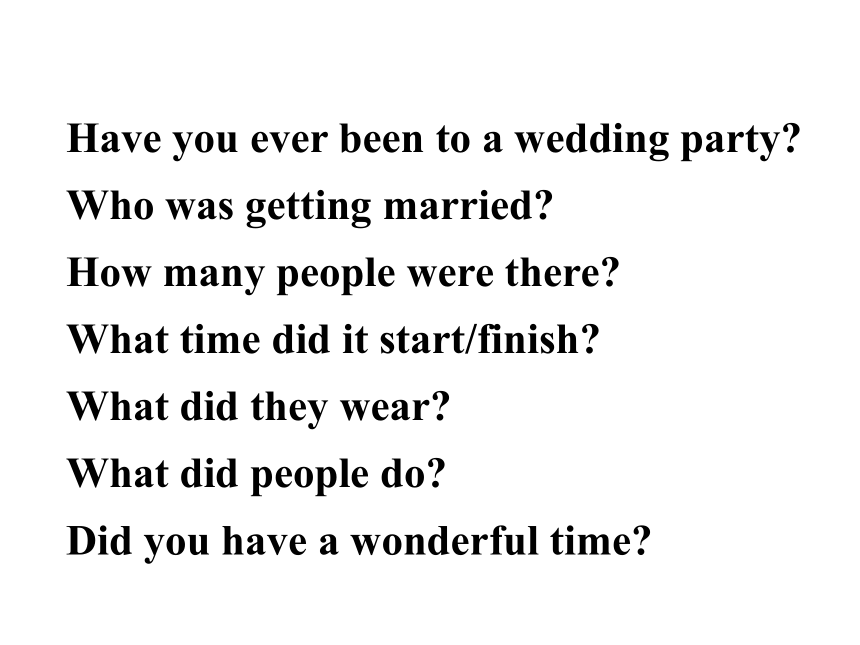
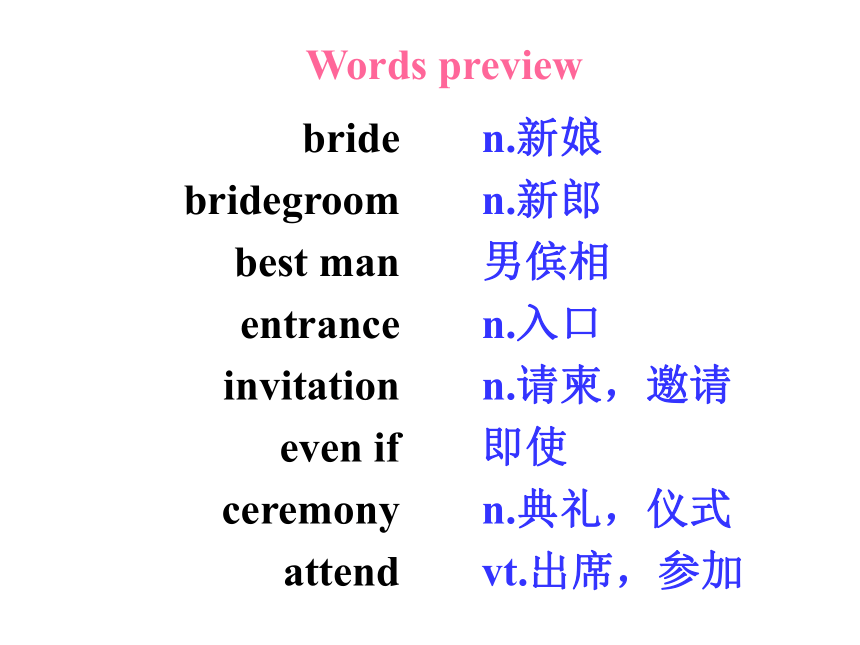
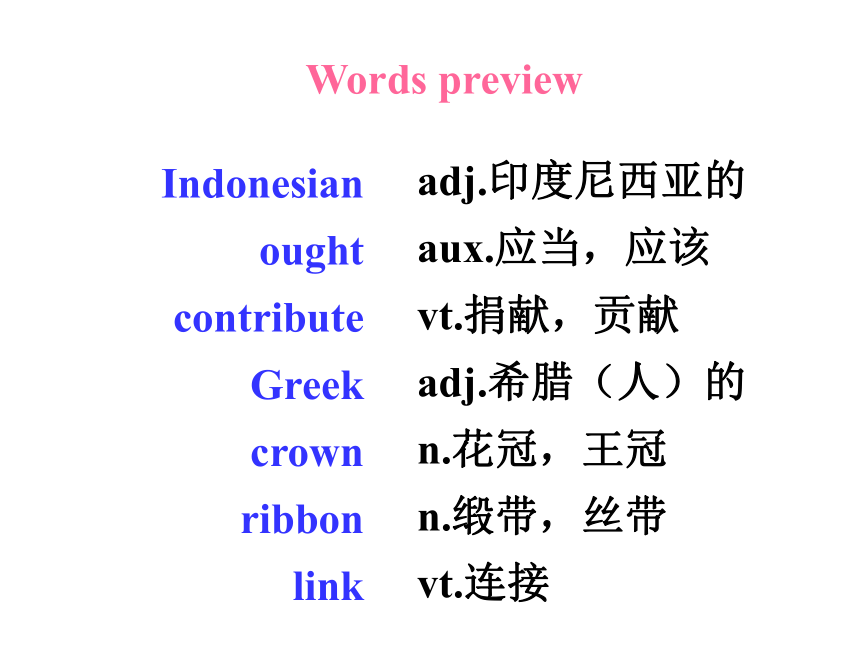
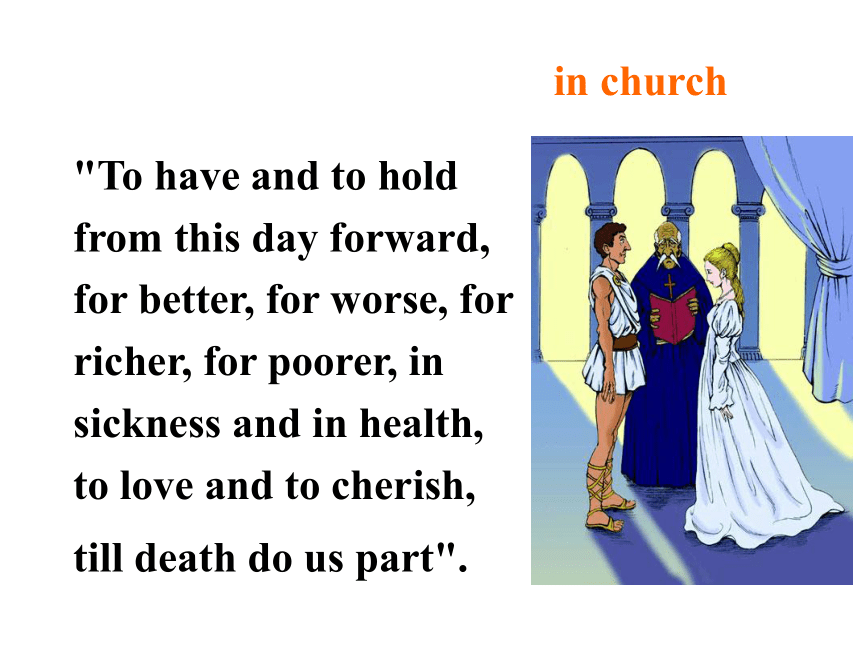
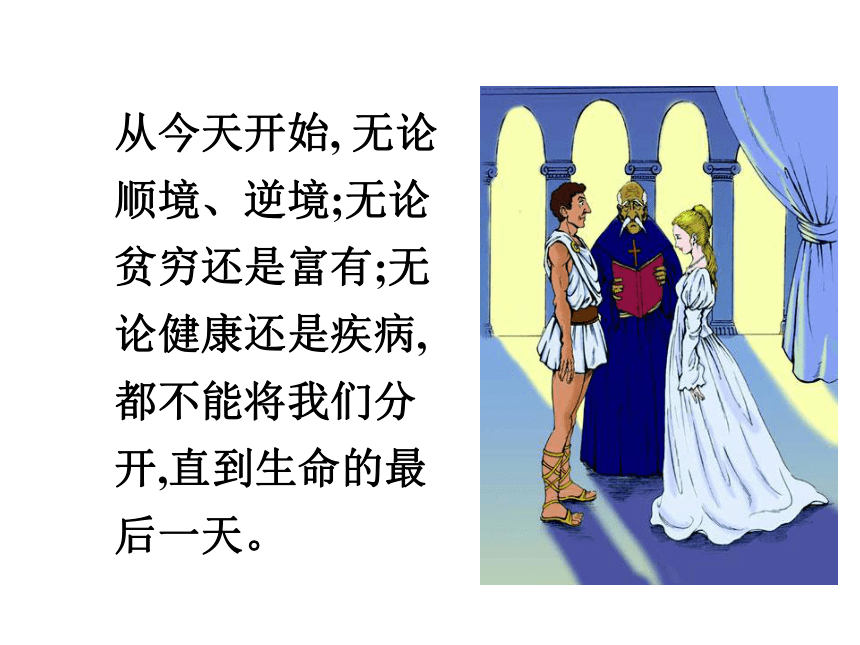
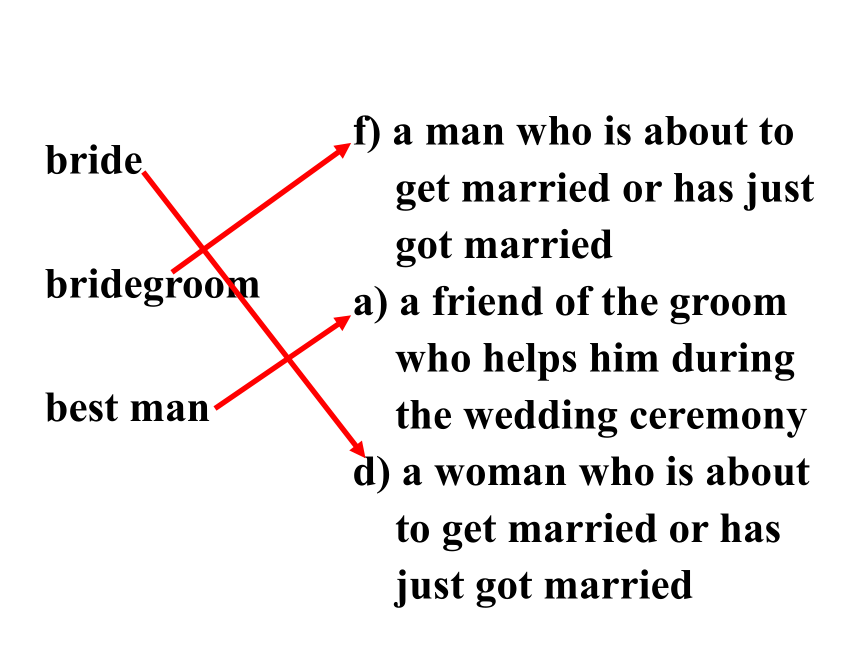
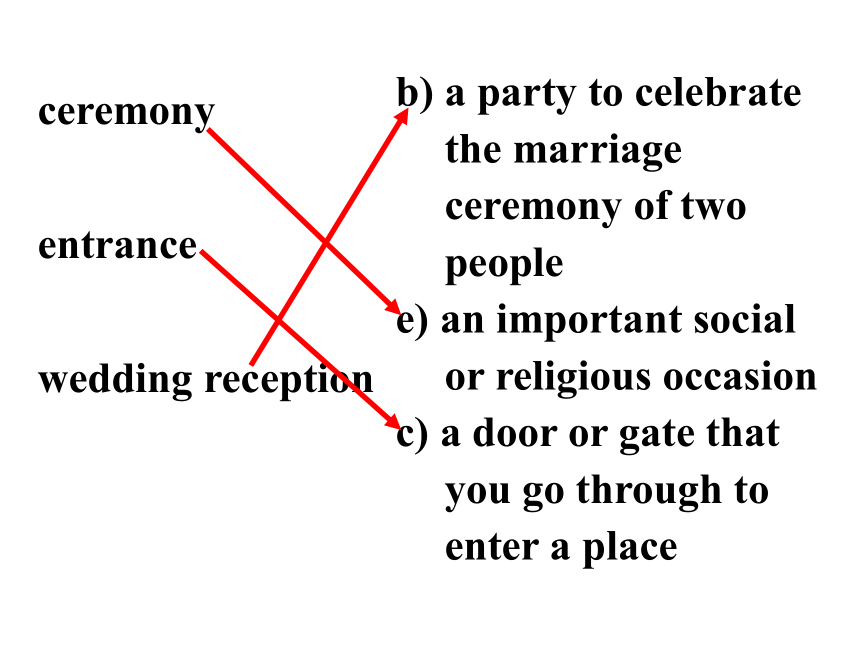
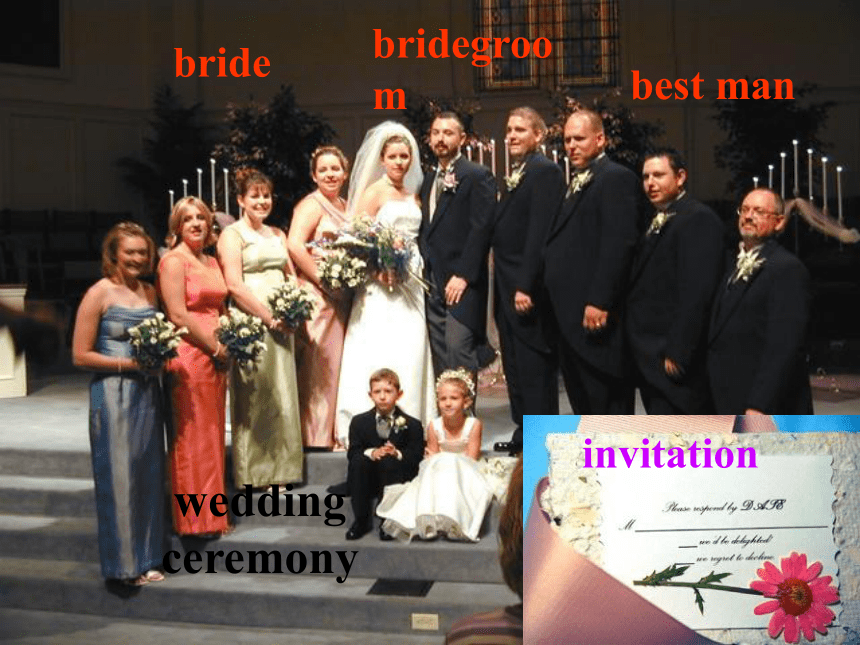
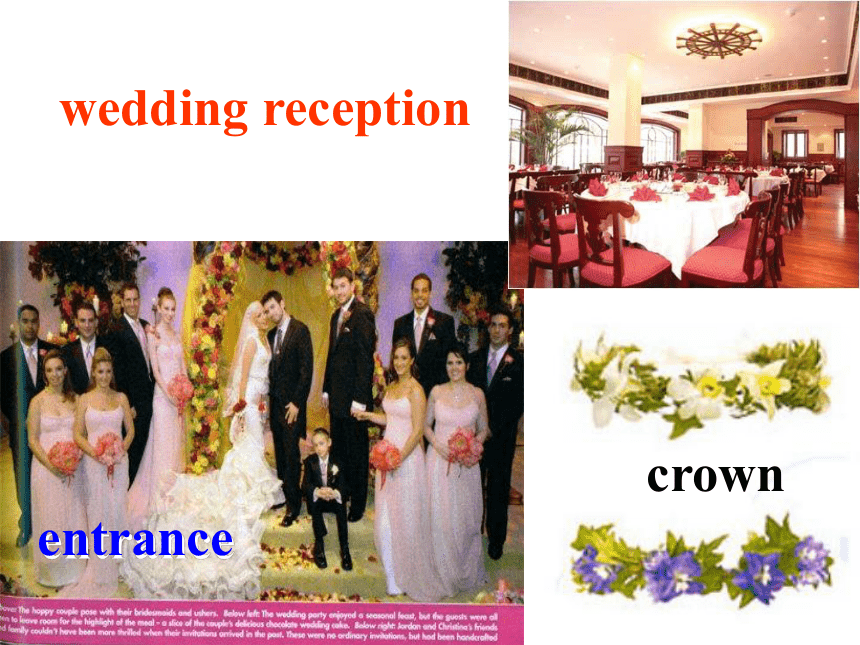
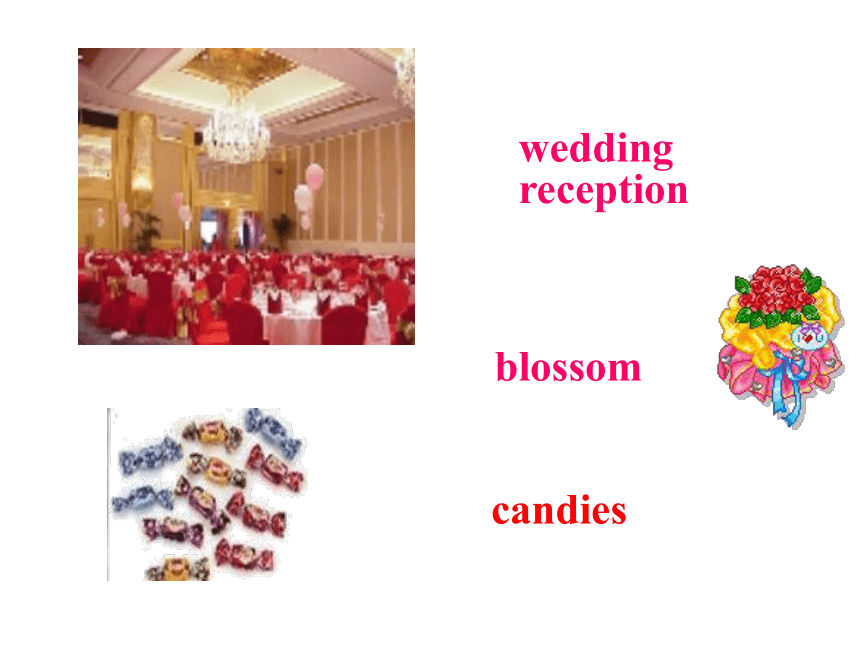
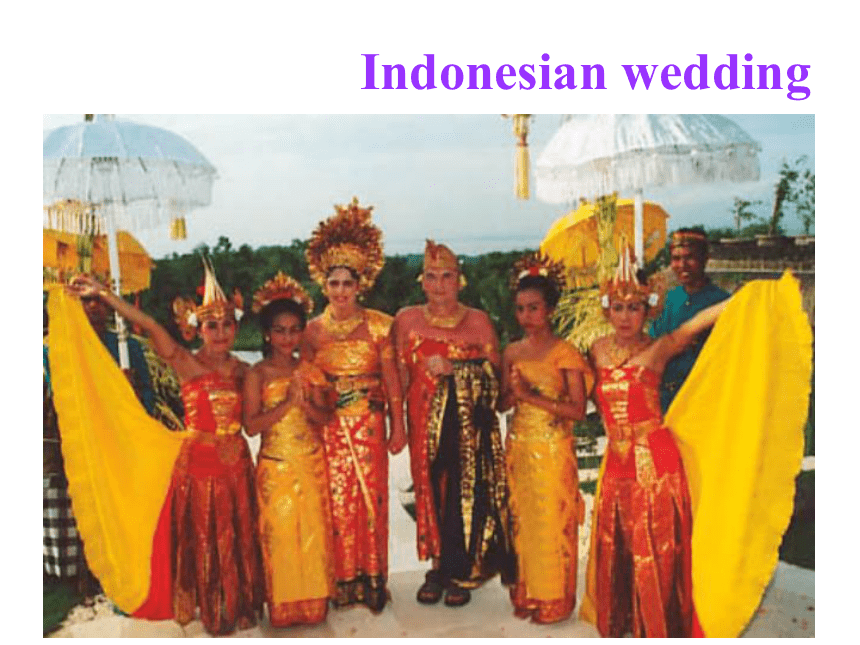
文档简介
Have you ever been to a wedding party?
Who was getting married?
How many people were there?
What time did it start/finish?
What did they wear?
What did people do?
Did you have a wonderful time?
Words preview
bride
bridegroom
best man
entrance
invitation
even if
ceremony
attend
n.新娘
n.新郎
男傧相
n.入口
n.请柬,邀请
即使
n.典礼,仪式
vt.出席,参加
Indonesian
ought
contribute
Greek
crown
ribbon
link
adj.印度尼西亚的
aux.应当,应该
vt.捐献,贡献
adj.希腊(人)的
n.花冠,王冠
n.缎带,丝带
vt.连接
Words preview
in church
"To have and to hold from this day forward, for better, for worse, for richer, for poorer, in sickness and in health, to love and to cherish, till death do us part".
Weddings…
从今天开始, 无论顺境、逆境;无论贫穷还是富有;无论健康还是疾病,都不能将我们分开,直到生命的最后一天。
bride
bridegroom
best man
f) a man who is about to get married or has just got married
a) a friend of the groom who helps him during the wedding ceremony
d) a woman who is about to get married or has just got married
Match
b) a party to celebrate the marriage ceremony of two people
e) an important social or religious occasion
c) a door or gate that you go through to enter a place
ceremony
entrance
wedding reception
bride
best man
bridegroom
invitation
wedding
ceremony
entrance
crown
wedding reception
wedding
reception
blossom
candies
Indonesian wedding
Reading
I can go without an invitation.
I can attend the reception after the ceremony.
I ought to put money into the box at the entrance of the reception.
What to do:
You oughtn’t to go to the ceremony without asking first.
You don’t have to contribute a lot of money.
You can’t drink alcohol at the wedding reception.
Indonesian women don’t have to cover their heads.
What not to do:
Greek wedding
before the wedding ceremony
The bridegroom has to ask the bride’s father for his daughter’s hand in marriage.
during the wedding ceremony
The best man should help put crowns made of flowers on the heads of the couple.
A long silk ribbon that links the crowns is a symbol of a long and happy life for the couple.
after the wedding ceremony
The guests can attend a wedding reception.
Guests can throw dishes on the floor and put money on the bride’s dress for good luck.
The party can last through the night.
1. Indonesian families only invite people they have known for a long time.
2. The reception is before the wedding.
3. Guests usually give money as a present.
T
F
F
True or false
4. In Greek culture , the bridegroom has to ask for the bride’s hand in marriage.
5. The bride and bridegroom’s wedding crowns are made of gold.
6. A piece of ribbon links the wedding crowns together.
T
F
T
Language points
1. even if 即使
即使你知道这个秘密, 你也应该保持沉默。
Even if you know the secret you should keep silent.
2. close family 近亲
close friend 亲密的朋友
Sit close against the wall. 紧靠墙坐着(指距离近)
close势均力敌的;几乎相等的
a close game 一场不相上下的比赛
3. contribute (oneself) to sth.
contribution n
make contributions to sth./sb.
(1) 捐献、捐赠;捐(钱)
他为穷人捐了很多的食品和衣服。
He contributed a lot of food and clothes to the poor.
(2) 献身于…
他投身于研究工作。
He contributed himself to doing research.
(3) 投稿, 撰稿
他向报社投了一篇诗稿。
He contributed a poem to a newspaper.
(4) 贡献
他为国家做出了巨大贡献。
He made great contribution to the country.
他对计算机的发明做出了巨大贡献。
He made great contribution to the invention of computer.
4. …help put crowns made of flowers…
= …help put crowns which are made of flowers…
made of flowers过去分词短语作定语,可转换为定语从句。
Finally they found the pot buried underground.
= Finally they found the pot which was buried underground.
1.即使我这次失败了,我还要再试试。
Even if I fail this time, I would try again.?
2.教堂在学校附近。
The church is close to the school.?
3.诚实加苦干有助于成功和幸福。
Honesty and hard work contribute to success and happiness.?
Grammar
have to / not have to, can / can’t, ought to / ought not to
1. have to
1) have to表示一种客观的需要,意思是“不得不”。如:
今天下午我不得不参加一个重要的会议。
I have to attend an important meeting this afternoon.
妈妈不在家,因此我不得不照看商店。
Mother is out, so I have to look after the shop.
2) have to的否定形式是don’t have to,相当于needn’t。如:
他们目前没有必要买电脑。
They don’t have to buy a computer at present.
3) have to与have got to常可以互换。
比较must的用法
1)表示主观的义务和必要,主要用于肯定句和疑问句,意思为“必须……,得……,要……”;由must引起的疑问句,肯定回答要用must或have to,否定回答要用needn’t或don’t have to,意思是“不必”;must的否定形式mustn’t表示禁止,意思是“不能,不许”。
我们必须找一个学好电脑的方法。
We must find a good method to learn computer well.
2)表示肯定的猜测,常用于肯定句中,意思为“一定是,必然……”。
注意must表示推断或猜测的几种情况:
你姐姐一定是这家医院的医生。
Your sister must be a doctor in this hospital.(现在的猜测)
2. can
1) (表示能力、功能)能,会
这教室能坐三十位学生。
The classroom can seat thirty students
琼现在会开车了。
June can drive now.
2) (表示可能性)可能,可能会
我认为这项工作能提前完成。
I think the work can be completed ahead of time.
3) (表示允许、请求)可以
你不可以将这本书拿出室外。
You can't take the book out of the room.
我可以用一下你的笔吗?
Can I use your pen?
4) (表示命令)必须
你如不保持安静,就请你走。
If you won't keep quiet you can get out.
5) (表示偶然发生的可能性)有时会
那里有时容易刮风,特别在春季。
It can be quite windy there, especially in spring.
6) (表示惊讶)究竟;竟至于
到底那是怎么一回事?
What can it possibly be?
3.ought to
1) ought to 是一个可以加上to 的情态动词其意思与should是一样的,但是ought to 不能用于虚拟语气中表示推测,而should可以
2) ought to 更多反映客观情况,表示根据法律,义务“应当”,比should 语气强, should 表示主观看法,一些建议,劝说。
生活应遵守规律,因为规律对健康有益。
Regularity ought to be observed, as regularity is very conducive to health.?
1.我们明天必须离开,真是遗憾。
It is a pity that we shall have to leave tomorrow.?
2.你怎么可以这样说?
How can you say that??
3.中国应当对于人类有较大的贡献。
China ought to make a greater contribution to humanity.?
1. have to
2. don’t have to
3. can
4. can’t
5. ought
6. ought not to
not necessary
necessary
not allowed/not possible
allowed/possible
not advisable
advisable
Match the words to their meanings.
Complete the passage below with the following words: have to, don’t have to, can’t, can, ought to, ought not to
Weddings are happy occasions but when my sister got married last year, my mum and sister did not agree on anything. First it was the dress. My mum said, “Lisa, you ______ wear a white dress,” and my sister replied, “I ____________ wear white. I ____wear pink if I like.”
have to
don’t have to
can
Next it was the invitations. My mum
said, “ Lisa, you really _______ invite Sally,” and my sister replied, “I ___________ invite her---we have too many people already.” Then it was the flowers. My mum said, “you ____ have
lilies.
ought to
don’t have to
can’t
I’ve heard that they’re bad luck,”
and my sister replied, “Of course I ___
have lilies! I don’t believe they’re unlucky!” and then it was the cake!“ You really _______ have a fruit cake, Lisa,” said my mum, but Lisa wanted chocolate.
Finally, I told them that they really ___________ argue so much because it makes me hate weddings for life!
can
ought to
ought not to
My MP4 player isn’t in my bag. Where I have put it? (2007福建)
A. can B. must C. should D. would
The biggest problem for most plants, which ________ just get up and run away when threatened, is that animals like to eat them. (2007 湖南)
A. shan’t B. can’t
C. needn’t D. mustn’t
—What do you think we can do for our aged parents?
—You ___ do anything except to be with them and be yourself. (2007重庆)
A. don’t have to B. oughtn’t to
C. mustn’t D. can’t
Vocabulary: word building
You can often make nouns from verbs by adding the suffixes “ –tion” and “-ance”. However, spellings may change somewhat. Make nouns from these verbs by completing the table.
Verbs
invite
receive
attend
enter
contribute
Nouns
invitation
reception
attendance
entrance
contribution
1. Have you been ______ to Ben’s party? Yes, I received an ________ to his party today.
2. Jeremy, you didn’t ______ class this morning. __________ is necessary if you want to pass!
Use the verbs and nouns above to complete the sentences below.
invited
invitation
attend
Attendance
3. The room has a secret ________ you can only _____ if you know where it is.
4. We had a lovely wedding _________. We ____________ so many beautiful presents!
5. You ought to _________ money. But your ___________ doesn’t need to be big.
reception
have received
contribute
contribution
entrance
enter
What happens at wedding in your town/city? Use modal verbs and expressions from the lesson to write about some of these things.
clothes, reception, ceremony, flowers, presents, songs, food, speeches
Discuss our school rules in groups, by using the modals: have to / not have to, can/can’t , should/ shouldn’t.
For example:
Presenter: Can you tell us our school rules?
A: Yes you can’t dye your hair colorful.
B: …….
C: …….
Homework
Write eight sentences giving advice to a foreigner who is going to a wedding in your town /city.
Who was getting married?
How many people were there?
What time did it start/finish?
What did they wear?
What did people do?
Did you have a wonderful time?
Words preview
bride
bridegroom
best man
entrance
invitation
even if
ceremony
attend
n.新娘
n.新郎
男傧相
n.入口
n.请柬,邀请
即使
n.典礼,仪式
vt.出席,参加
Indonesian
ought
contribute
Greek
crown
ribbon
link
adj.印度尼西亚的
aux.应当,应该
vt.捐献,贡献
adj.希腊(人)的
n.花冠,王冠
n.缎带,丝带
vt.连接
Words preview
in church
"To have and to hold from this day forward, for better, for worse, for richer, for poorer, in sickness and in health, to love and to cherish, till death do us part".
Weddings…
从今天开始, 无论顺境、逆境;无论贫穷还是富有;无论健康还是疾病,都不能将我们分开,直到生命的最后一天。
bride
bridegroom
best man
f) a man who is about to get married or has just got married
a) a friend of the groom who helps him during the wedding ceremony
d) a woman who is about to get married or has just got married
Match
b) a party to celebrate the marriage ceremony of two people
e) an important social or religious occasion
c) a door or gate that you go through to enter a place
ceremony
entrance
wedding reception
bride
best man
bridegroom
invitation
wedding
ceremony
entrance
crown
wedding reception
wedding
reception
blossom
candies
Indonesian wedding
Reading
I can go without an invitation.
I can attend the reception after the ceremony.
I ought to put money into the box at the entrance of the reception.
What to do:
You oughtn’t to go to the ceremony without asking first.
You don’t have to contribute a lot of money.
You can’t drink alcohol at the wedding reception.
Indonesian women don’t have to cover their heads.
What not to do:
Greek wedding
before the wedding ceremony
The bridegroom has to ask the bride’s father for his daughter’s hand in marriage.
during the wedding ceremony
The best man should help put crowns made of flowers on the heads of the couple.
A long silk ribbon that links the crowns is a symbol of a long and happy life for the couple.
after the wedding ceremony
The guests can attend a wedding reception.
Guests can throw dishes on the floor and put money on the bride’s dress for good luck.
The party can last through the night.
1. Indonesian families only invite people they have known for a long time.
2. The reception is before the wedding.
3. Guests usually give money as a present.
T
F
F
True or false
4. In Greek culture , the bridegroom has to ask for the bride’s hand in marriage.
5. The bride and bridegroom’s wedding crowns are made of gold.
6. A piece of ribbon links the wedding crowns together.
T
F
T
Language points
1. even if 即使
即使你知道这个秘密, 你也应该保持沉默。
Even if you know the secret you should keep silent.
2. close family 近亲
close friend 亲密的朋友
Sit close against the wall. 紧靠墙坐着(指距离近)
close势均力敌的;几乎相等的
a close game 一场不相上下的比赛
3. contribute (oneself) to sth.
contribution n
make contributions to sth./sb.
(1) 捐献、捐赠;捐(钱)
他为穷人捐了很多的食品和衣服。
He contributed a lot of food and clothes to the poor.
(2) 献身于…
他投身于研究工作。
He contributed himself to doing research.
(3) 投稿, 撰稿
他向报社投了一篇诗稿。
He contributed a poem to a newspaper.
(4) 贡献
他为国家做出了巨大贡献。
He made great contribution to the country.
他对计算机的发明做出了巨大贡献。
He made great contribution to the invention of computer.
4. …help put crowns made of flowers…
= …help put crowns which are made of flowers…
made of flowers过去分词短语作定语,可转换为定语从句。
Finally they found the pot buried underground.
= Finally they found the pot which was buried underground.
1.即使我这次失败了,我还要再试试。
Even if I fail this time, I would try again.?
2.教堂在学校附近。
The church is close to the school.?
3.诚实加苦干有助于成功和幸福。
Honesty and hard work contribute to success and happiness.?
Grammar
have to / not have to, can / can’t, ought to / ought not to
1. have to
1) have to表示一种客观的需要,意思是“不得不”。如:
今天下午我不得不参加一个重要的会议。
I have to attend an important meeting this afternoon.
妈妈不在家,因此我不得不照看商店。
Mother is out, so I have to look after the shop.
2) have to的否定形式是don’t have to,相当于needn’t。如:
他们目前没有必要买电脑。
They don’t have to buy a computer at present.
3) have to与have got to常可以互换。
比较must的用法
1)表示主观的义务和必要,主要用于肯定句和疑问句,意思为“必须……,得……,要……”;由must引起的疑问句,肯定回答要用must或have to,否定回答要用needn’t或don’t have to,意思是“不必”;must的否定形式mustn’t表示禁止,意思是“不能,不许”。
我们必须找一个学好电脑的方法。
We must find a good method to learn computer well.
2)表示肯定的猜测,常用于肯定句中,意思为“一定是,必然……”。
注意must表示推断或猜测的几种情况:
你姐姐一定是这家医院的医生。
Your sister must be a doctor in this hospital.(现在的猜测)
2. can
1) (表示能力、功能)能,会
这教室能坐三十位学生。
The classroom can seat thirty students
琼现在会开车了。
June can drive now.
2) (表示可能性)可能,可能会
我认为这项工作能提前完成。
I think the work can be completed ahead of time.
3) (表示允许、请求)可以
你不可以将这本书拿出室外。
You can't take the book out of the room.
我可以用一下你的笔吗?
Can I use your pen?
4) (表示命令)必须
你如不保持安静,就请你走。
If you won't keep quiet you can get out.
5) (表示偶然发生的可能性)有时会
那里有时容易刮风,特别在春季。
It can be quite windy there, especially in spring.
6) (表示惊讶)究竟;竟至于
到底那是怎么一回事?
What can it possibly be?
3.ought to
1) ought to 是一个可以加上to 的情态动词其意思与should是一样的,但是ought to 不能用于虚拟语气中表示推测,而should可以
2) ought to 更多反映客观情况,表示根据法律,义务“应当”,比should 语气强, should 表示主观看法,一些建议,劝说。
生活应遵守规律,因为规律对健康有益。
Regularity ought to be observed, as regularity is very conducive to health.?
1.我们明天必须离开,真是遗憾。
It is a pity that we shall have to leave tomorrow.?
2.你怎么可以这样说?
How can you say that??
3.中国应当对于人类有较大的贡献。
China ought to make a greater contribution to humanity.?
1. have to
2. don’t have to
3. can
4. can’t
5. ought
6. ought not to
not necessary
necessary
not allowed/not possible
allowed/possible
not advisable
advisable
Match the words to their meanings.
Complete the passage below with the following words: have to, don’t have to, can’t, can, ought to, ought not to
Weddings are happy occasions but when my sister got married last year, my mum and sister did not agree on anything. First it was the dress. My mum said, “Lisa, you ______ wear a white dress,” and my sister replied, “I ____________ wear white. I ____wear pink if I like.”
have to
don’t have to
can
Next it was the invitations. My mum
said, “ Lisa, you really _______ invite Sally,” and my sister replied, “I ___________ invite her---we have too many people already.” Then it was the flowers. My mum said, “you ____ have
lilies.
ought to
don’t have to
can’t
I’ve heard that they’re bad luck,”
and my sister replied, “Of course I ___
have lilies! I don’t believe they’re unlucky!” and then it was the cake!“ You really _______ have a fruit cake, Lisa,” said my mum, but Lisa wanted chocolate.
Finally, I told them that they really ___________ argue so much because it makes me hate weddings for life!
can
ought to
ought not to
My MP4 player isn’t in my bag. Where I have put it? (2007福建)
A. can B. must C. should D. would
The biggest problem for most plants, which ________ just get up and run away when threatened, is that animals like to eat them. (2007 湖南)
A. shan’t B. can’t
C. needn’t D. mustn’t
—What do you think we can do for our aged parents?
—You ___ do anything except to be with them and be yourself. (2007重庆)
A. don’t have to B. oughtn’t to
C. mustn’t D. can’t
Vocabulary: word building
You can often make nouns from verbs by adding the suffixes “ –tion” and “-ance”. However, spellings may change somewhat. Make nouns from these verbs by completing the table.
Verbs
invite
receive
attend
enter
contribute
Nouns
invitation
reception
attendance
entrance
contribution
1. Have you been ______ to Ben’s party? Yes, I received an ________ to his party today.
2. Jeremy, you didn’t ______ class this morning. __________ is necessary if you want to pass!
Use the verbs and nouns above to complete the sentences below.
invited
invitation
attend
Attendance
3. The room has a secret ________ you can only _____ if you know where it is.
4. We had a lovely wedding _________. We ____________ so many beautiful presents!
5. You ought to _________ money. But your ___________ doesn’t need to be big.
reception
have received
contribute
contribution
entrance
enter
What happens at wedding in your town/city? Use modal verbs and expressions from the lesson to write about some of these things.
clothes, reception, ceremony, flowers, presents, songs, food, speeches
Discuss our school rules in groups, by using the modals: have to / not have to, can/can’t , should/ shouldn’t.
For example:
Presenter: Can you tell us our school rules?
A: Yes you can’t dye your hair colorful.
B: …….
C: …….
Homework
Write eight sentences giving advice to a foreigner who is going to a wedding in your town /city.
